About
Author: Laszlo Krasznahorkai (Hungary)
Genre: Dystopian
Setting
Place: Somewhere in Hungary
Time: 1980s perhaps
My Rating (see what this means)
My Subjective Rating: 3
My ‘Objective’ Rating: 3.42
Introduction
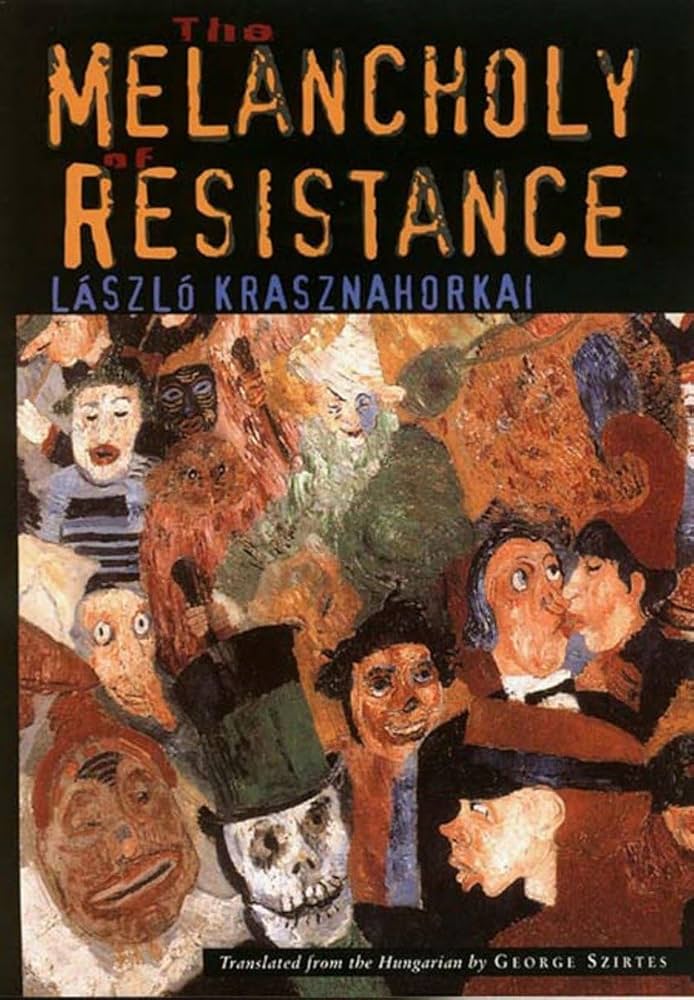
In his book ‘The Melancholy of Resistance’, Laszlo Krasznahorkai manages to create paranoia with such vivid imagery, I would have refused to believe possible until I read just the first 10 or so pages. But Mrs. Plauf journey back to her home captured in these first pages is only a miniature view of the bleak reality that plagues the unnamed Hungarian town of the story.
The arrival of a mysterious circus – with just one exhibit – the carcass of the largest whale in the world accelerates what was anyway inevitable – the unstoppable rot of an already decaying society. Each of the characters in the book react to this in different ways and Krasznahorkai manages to create a powerfully bleak narrative in this devastatingly bleak novel.
Add to it the long convoluted sentences which make it a demanding read – one might wonder why read the novel in the first place? And while I admit I didn’t get all the allegories in this highly allegorical work – the simple realization that writing can create such wonders make it a worthy read. And as I process the book over time – for ‘it passes but does not pass away’ maybe I will also get the messages it intends to convey. That makes me sure it will only get worthier.
Synopsis and Review (has spoilers)
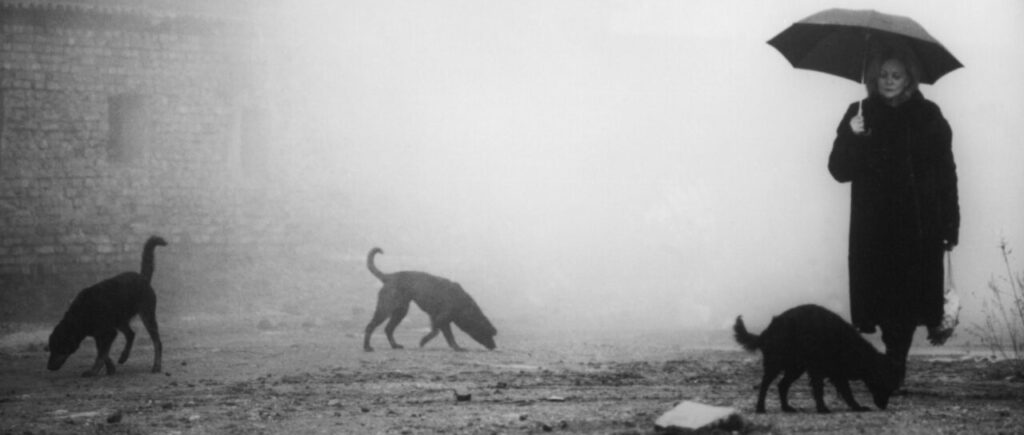
Each of the characters of the book has a different way of dealing with the grim stagnation plaguing the town – for instance – in Mrs. Plauf’s case a continuous paranoia about all things whether mundane or sinister; for Mr. Eszter a disengaged nihilism where he occupies himself and fails to find the perfect pitch while simultaneously being grumpy about life and his wife, often not without good reason; for his wife Tunde Eszter a conniving opportunism in her cynical quest for power – even at the cost of some – to her anyway pathetic – lives. The only person capable of keeping his optimism alive was the ‘half-wit’ Valuska – Mrs. Plauf son and Mr. Eszter’s errand boy – but his head was anyway more among the stars – to notice the frozen garbage across the town.
There is no specific disaster, or tragedy that bought about the already post-apocalyptic setting of the town.
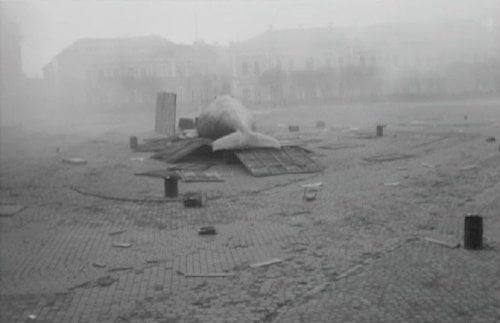
None’s required for inevitable deterioration anyway. But the arrival of the mysterious circus is all the signs an apocalyptic-minded people need to expect disaster. Mrs. Plauf is as expected – paranoid. Mr. Eszter fully prepared to ignore it, but his dangerous-pre-historic-beast of a wife has other ideas. Mrs. Eszter (Tunde) who has facilitated the arrival of the circus in the first place – intends to use the disaster as the reckoning essential for the new beginning – and succeeds even. But the most important impact of the circus happens on the naïve Valuska who – fails to understand it, gets afraid of it, and then gets subsumed as part of the mob it unleashes. The mob itself was mindless –
… and then it made no difference whether we bore left or right, we simply flooded every street and square, for one thing and one thing alone drove us and confronted us at every turn, a hollow sense of fear combined with resignation that left us with some hope of mercy; nor were there any orders or words of command, no attempt at calculation, no taking of risks and no danger, since there was nothing left to lose, everything having become intolerable, unbearable, beyond the pale; each house, each fence, each advertising pillar, telegraph post, shop or the post office, even the lightly drifting odours of the bakery, had become intolerable; intolerable too every precept of law and order, every petty demanding obligation, the continuous and hopeless expenditure of energy in the attempt to suggest that there might be some point to all this rather than be faced by the unyielding, indifferent, universal incomprehensibility of things; intolerable too the inexplicable ground – rules of human conduct.
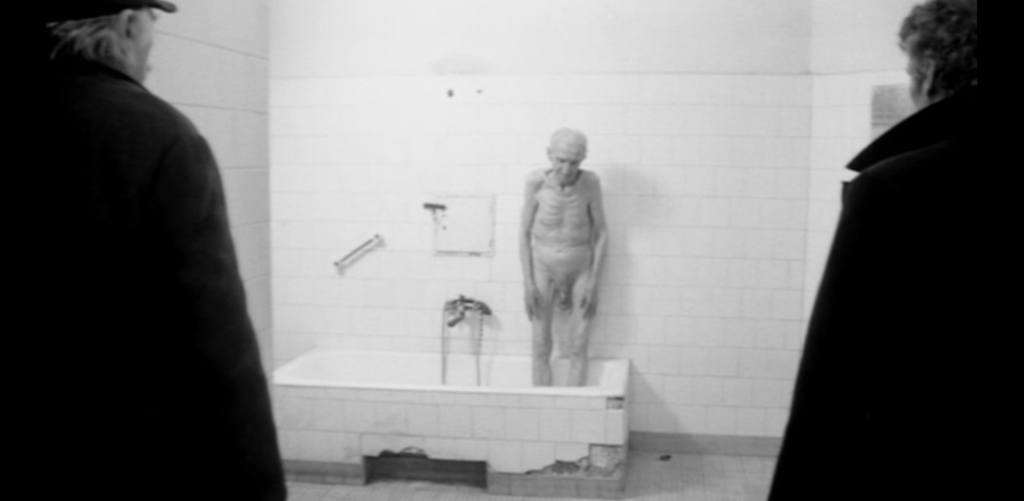
I must confess that – until the terrible costs of Tunde’s scheming and the cynicism of her actions were revealed, her plot of getting the local people to finally come to recognize that it was ‘better to burn in a fever of activity than to put your slippers on and hide your head in the pillows’, seemed better to me than her husband’s nihilistic rejection of society. This fact left me quite uncomfortable – for I wondered, while certainly not what Tunde did, but is there a threshold of ‘opportunistic cynicism’ I might accept just because it has potential to get something out of a rut – even accepting the temporariness of it? 😬
So, in my mind the book builds on the two realities of society –
- The Impossibility of Perfection
- The Inevitability of Deterioration
The impossiblity of perfection is easy to address – just make it the non-necessity of perfection – and it is highlighted in the novel when Mr. Eszter, devasted by the events – decides to go home – tune his piano to the Werckmeister Harmonies despite knowing that the scale is imperfect – and plays Bach prelude in B major – just because it is a beautiful thing regardless.
As for the inevitability of deterioration – while I reject nihilism – one of my favourite monologues from Rick and Morty helps –
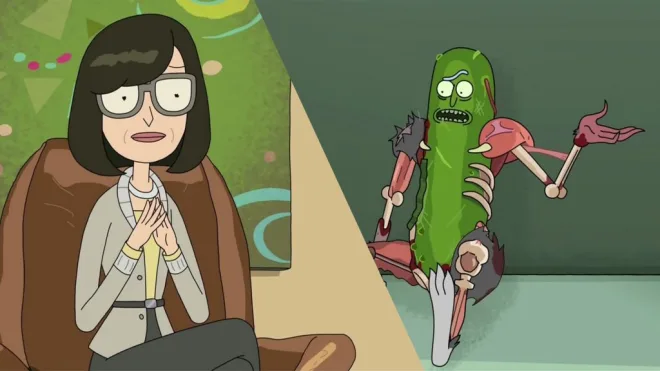
Dr. Wong vs. Pickle Rick
“Rick…I have no doubt you would be bored senseless by therapy. The same way i’m bored when I brush my teeth and wipe my ass. Because the thing about repairing, maintaining, and cleaning is: it’s not an adventure. There’s no way to do it so wrong you might die. It’s just work. And the bottom line is: some people are okay going to work and some people… well, some people would rather die. Each of us gets to choose.”
And then it stuck me – even the nihilistic Mr. Eszter keeps tuning his Steinway again and again and again – knowing it will inevitably get out of tune again – is he choosing going to work!! For deterioration maybe inevitable, beauty can still be found – atleast for a while.
P.S. – I recognize that this argument is something Tunde can twist to justify her authoritarianism – and currently I don’t sufficiently challenge the same. Hoping to figure it out over time. Comment if you have anything to add.
Picture Credits:
- Werckmeister Harmonies movie
- Rick and Morty TV series